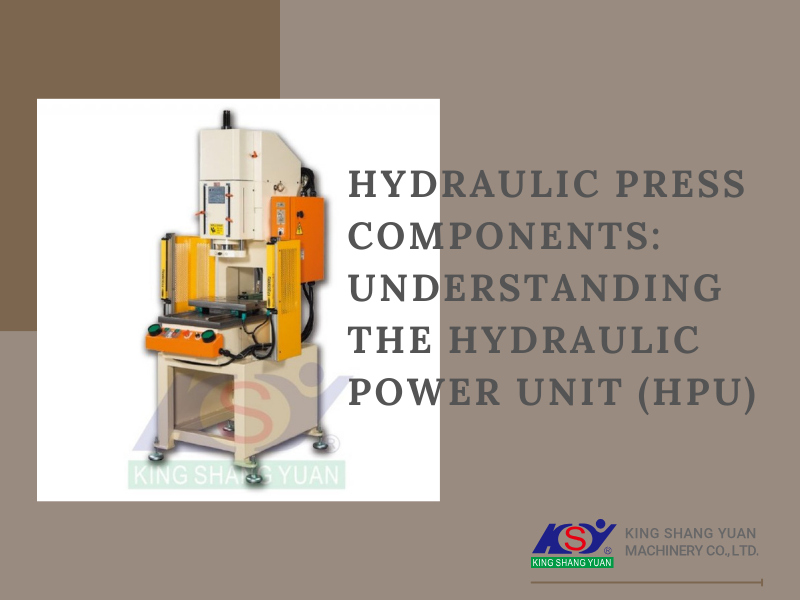
When it comes to hydraulic press machines, the system’s performance and reliability depend largely on its core components. Among these, the Hydraulic Power Unit (HPU) is often referred to as the “heart” of the press. Without it, the machine cannot generate the pressure required to perform forming, stamping, or assembly operations. In this article, we’ll take a closer look at the hydraulic press components that make up an HPU, explain how they function, and discuss why their quality is vital for long-term productivity.
1. What Is a Hydraulic Power Unit (HPU)?
The Hydraulic Power Unit is the central system that powers a hydraulic press. It converts mechanical energy into hydraulic energy through a motor-driven pump, delivering pressurized fluid to the cylinder. This high-pressure fluid enables the press to generate force, making it possible to shape, cut, or assemble materials with precision.
A typical HPU consists of:
-
Reservoir (Oil Tank)
-
Pump
-
Motor
-
Valves and Manifold
-
Filtration System
-
Cooling System
Each part works together seamlessly to ensure consistent, controlled, and efficient press operation.
2. The Reservoir – Storing and Conditioning Hydraulic Fluid
The reservoir, or oil tank, is more than just a storage container. It also:
-
Helps dissipate heat from the fluid.
-
Allows air and contaminants to separate before the oil is pumped.
-
Provides a buffer for changes in system volume.
In well-designed hydraulic presses, reservoirs are built with enough capacity to ensure stable system operation and reduce the risk of overheating. High-quality reservoirs also include sight gauges, breathers, and drain valves for easier monitoring and maintenance.
3. The Pump – Delivering Flow and Pressure
The pump is a critical hydraulic press component that drives fluid from the reservoir into the system. Common pump types used in presses include:
-
Gear Pumps – Simple and reliable, best for lower-pressure applications.
-
Vane Pumps – Quieter and efficient, suited for medium-pressure systems.
-
Piston Pumps – Provide high pressure and efficiency, ideal for heavy-duty presses.
The choice of pump directly affects the machine’s performance, speed, and energy efficiency. Precision engineering ensures that pumps can deliver constant pressure while minimizing energy waste.
4. The Motor – Powering the Pump
The motor converts electrical energy into mechanical energy to drive the pump. Motors are typically selected based on the press’s tonnage and duty cycle. For industrial presses, high-efficiency motors with stable torque output are preferred, as they provide reliability for continuous operation.
5. Valves and Manifold – Directing the Flow
Valves regulate fluid direction, pressure, and flow, making them vital to the HPU’s performance. Types of valves used in hydraulic presses include:
-
Directional Control Valves – Determine the path of the fluid.
-
Pressure Relief Valves – Prevent system overload.
-
Flow Control Valves – Regulate speed and responsiveness.
These valves are often mounted on a manifold block for compactness and ease of service. High-quality valves reduce system failures and improve operator safety.
6. Filtration and Cooling – Ensuring System Reliability
Contaminants in hydraulic fluid can cause serious damage to pumps, valves, and cylinders. This is why filtration systems—including suction filters, pressure filters, and return-line filters—are essential.
Additionally, many HPUs are equipped with oil coolers (air-cooled or water-cooled) to keep fluid temperatures within safe ranges, ensuring consistent performance and longer component life.
7. Why Quality Components Matter in a Hydraulic Press
Every component of the HPU plays a role in ensuring the press delivers stable performance. Poorly designed or low-quality parts can lead to:
-
Frequent breakdowns
-
Higher maintenance costs
-
Inconsistent pressing force
-
Shorter machine lifespan
Investing in well-engineered hydraulic press components ensures safety, precision, and efficiency over the long term.
8. King Shang Yuan Machinery Co., Ltd. – Engineering Reliable Hydraulic Press Systems
At King Shang Yuan Machinery Co., Ltd., we understand that the reliability of a hydraulic press depends on the quality of its components—especially the Hydraulic Power Unit. Since 1993, we have specialized in designing presses that integrate robust HPUs with carefully selected pumps, motors, valves, and filtration systems.
Our product lineup includes:
-
Hydraulic Presses (1.5–50 tons) – Flexible for a variety of stamping and forming applications.
-
Rotatory-Type Hydraulic Presses – Designed for multi-station, automated production.
-
Hydraulic Presses for Lock Nut Notches and Assembly – Optimized for automotive and industrial applications.
-
Special Purpose Machines – Customized solutions for unique customer requirements.
By focusing on low failure rates, high efficiency, and durable hydraulic press components, we help manufacturers worldwide achieve stable, scalable production.
Final Thoughts
The Hydraulic Power Unit is the heart of every hydraulic press, and its components—reservoirs, pumps, motors, valves, filtration, and cooling systems—determine the machine’s overall reliability. For companies seeking consistent quality and long-term performance, choosing presses built with premium components is critical.
With over 30 years of expertise, King Shang Yuan Machinery Co., Ltd. delivers presses engineered with precision, innovation, and reliability, making us a trusted partner for industries across the globe.

